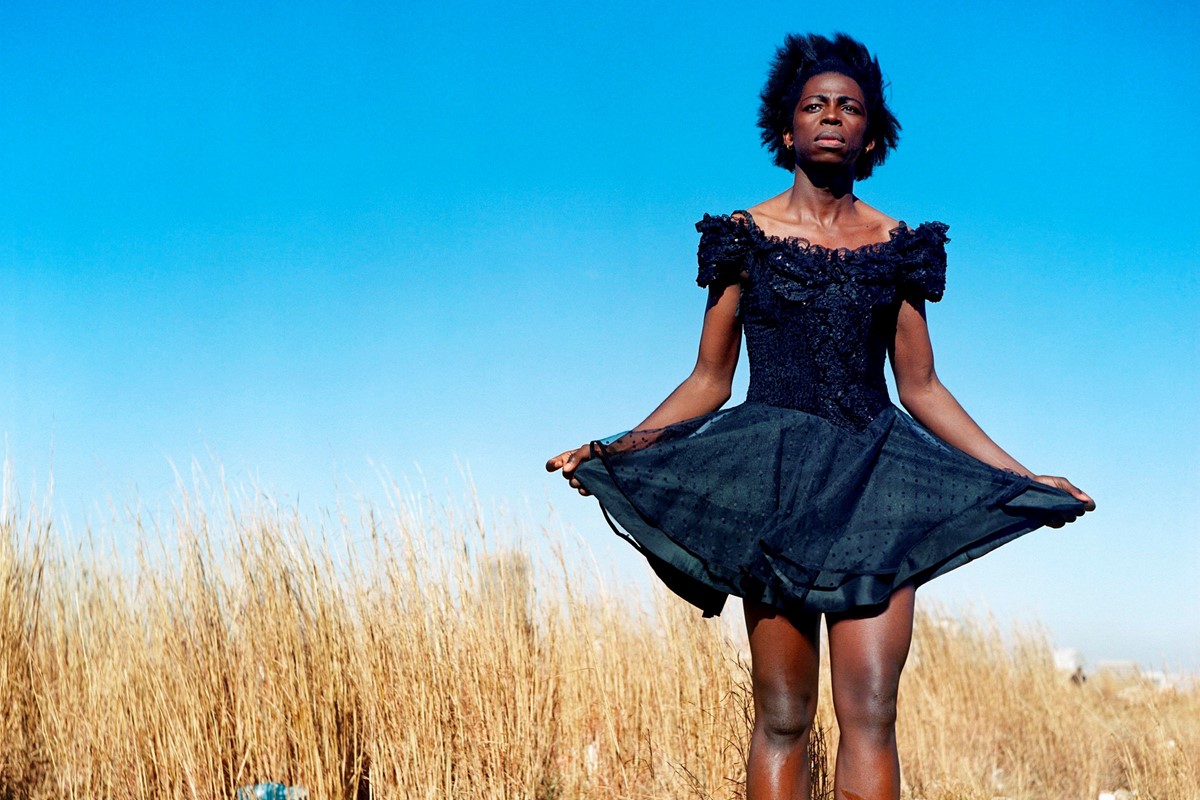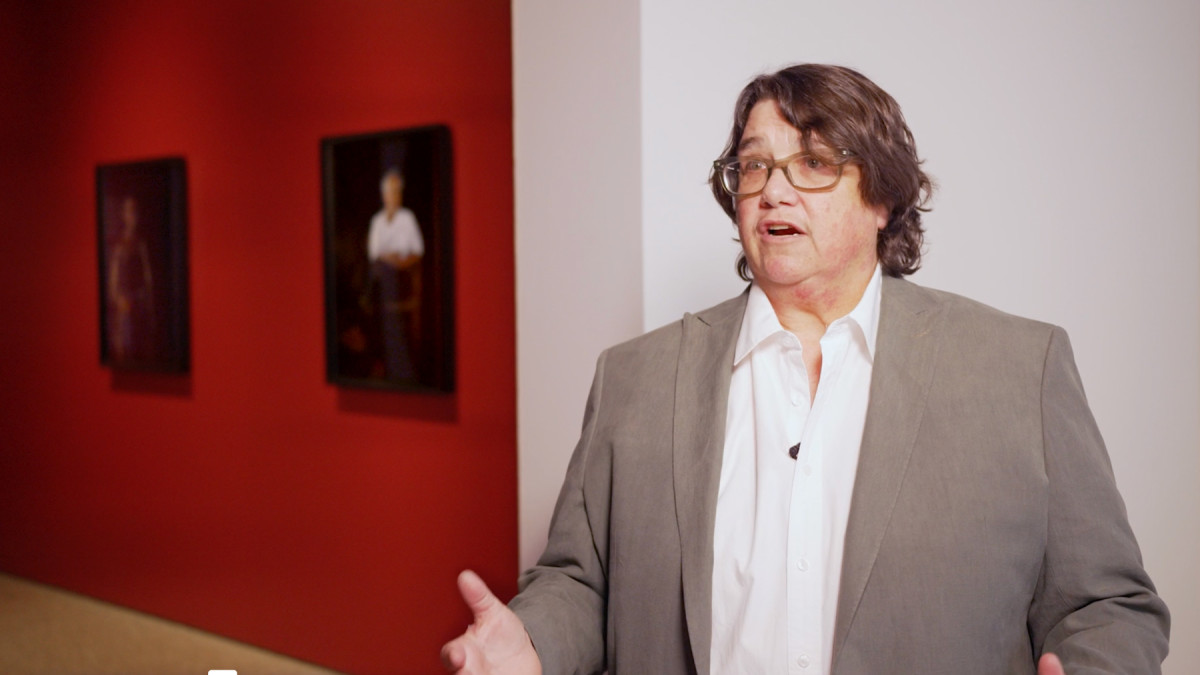
© » KADIST
Sadie Benning
In borrowing and subverting images from popular culture, Sadie Benning exposes the media’s role in constructing false and oppressive stereotypes of women, with regard to gender and sexual identity. This small painting, titled Mom , is a concise, eloquent visual statement. Many of her paintings incorporate found imagery, family photos, and everyday objects.

© » KADIST
Tammy Rae Carland
Carland’s series of large-format photographs Lesbian Beds (2002) depicts beds that have been recently vacated. Shot from directly above, they are lavish views of very private spaces. The artist plays to her viewers’ voyeuristic impulses, inviting us to look, but then denying us the opportunity to study the figures to whom the sheets belong, so that the rumpled covers become like anthropomorphic stand-ins inviting empathic projection.

© » KADIST
Zanele Muholi
As a visual activist for the rights of Lesbian, gay, bisexual, transgender, queer and intersex (LBGTQI), Muholi’s photographs radically transgress the conventional perception of lesbian and transgender communities in South Africa. Members of the LBGTQI community who suffer from continuous attacks — “corrective” and “curative rapes”, physical and psychological assaults, and hate crimes — Muholi works from her own community to create strong and positive images of empowered individuals. As visual statements, her photographs seek to dignify the members of an often hidden, voiceless and marginalized community.

© » KADIST
Zanele Muholi
As a visual activist for the rights of Lesbian, gay, bisexual, transgender, queer and intersex (LBGTQI), Muholi’s photographs radically transgress the conventional perception of lesbian and transgender communities in South Africa. Members of the LBGTQI community who suffer from continuous attacks — “corrective” and “curative rapes”, physical and psychological assaults, and hate crimes — Muholi works from her own community to create strong and positive images of empowered individuals. As visual statements, her photographs seek to dignify the members of an often hidden, voiceless and marginalized community.

© » KADIST
Zanele Muholi
As a visual activist for the rights of Lesbian, gay, bisexual, transgender, queer and intersex (LBGTQI), Muholi’s photographs radically transgress the conventional perception of lesbian and transgender communities in South Africa. Members of the LBGTQI community who suffer from continuous attacks — “corrective” and “curative rapes”, physical and psychological assaults, and hate crimes — Muholi works from her own community to create strong and positive images of empowered individuals. As visual statements, her photographs seek to dignify the members of an often hidden, voiceless and marginalized community.

© » KADIST
Catherine Opie
Catherine Opie’s candid photograph Cathy (bed Self-portrait) (1987) shows the artist atop a bed wearing a negligee and a dildo; the latter is attached to a whip that she holds in her teeth. Opie is known for her honest portraits of diverse individuals, from LGBT people to football players, and the self-portrait has also been a long-standing and important part of her practice. Instead of hiding her sexuality and interest in sadomasochism, Opie wears it proudly.

© » KADIST
Catherine Opie
Although best known as a provocateur and portraitist, Opie also photographs landscapes, cityscapes, and architecture. The Freeway Series was developed in 1995, right after the artist’s inclusion in that year’s Whitney Biennial. As if suggesting that her work should not be restricted to being seen through overtly political or activist lenses, this series lends insight into the city of Los Angeles via its most characteristic urban feature: its highways.

© » KADIST
Catherine Opie
In this work, a woman sits on a couch with her shirt pulled up to expose her pierced nipples, which are connected by a chain. She wears an expression of both pleasure and intensity as she points a gun at someone or something outside of the frame. Raven (gun) (1994) is not so much threatening as full of sexuality and potential energy.

© » KADIST
Catherine Opie
Alistair Fate (1994) depicts, presumably, a member of the LGBT community. Catherine Opie is known for her portraits of LGBT, queer, and outsider people; she intends them to come off not as shocking or different, but as human despite their deviance from societal norms. This image is one of several works by Opie in the Kadist Collection that show marginalized people, filtered through the artist’s signature appropriation of formal and classical portraiture in the interest of both documentation and reframing.

© » KADIST
Catherine Opie
Like many of Opie’s works, Mike and Sky presents female masculinity to defy a binary understanding of gender. The very practice of being photographed raises many complex issues around gender performance and the relationships between an inner self and an outer public persona. Even though Mike and Sky are cropped and obscure one another, many of their choices for self-presentation—as emphasized by their tattoos—remain visible.
Catherine Opie
- location: Los Angeles, California
- year born: 1961
- gender: female
- nationality: American
- home town: Sandusky, Ohio
Zanele Muholi
- year born: 1972
- gender: female
- nationality: South African
- home town: Umlazi, Durban, South Africa
Tammy Rae Carland
Using photography, text, and video, Tammy Rae Carland tactically realigns traditional ideas of love, partnership, domesticity, and family...
Sadie Benning
When she was fifteen Sadie Benning’s father gave her a kiddie PixelVision camera, a device that recorded grainy black-and-white video on standard audio cassettes...

© » ANOTHER
about 20 months ago (02/12/2024)
Zanele Muholi’s Potent Portrait of South Africa’s Queer Community | AnOther As their new exhibition opens in San Francisco, Zanele Muholi talks about their powerful photos of queer survivors of hate crimes, couples in everyday moments, and self-portraits referencing history February 02, 2024 Text Emily Steer Zanele Muholi creates potent portraits...

© » ROYAL ACADEMY
about 24 months ago (10/05/2023)
Video: Catherine Opie on photographing leading British artists | Blog | Royal Academy of Arts Catherine Opie in the RA Collection Gallery Video: Catherine Opie on photographing leading British artists Read more Become a Friend Video: Catherine Opie on photographing leading British artists Published 8 September 2023 Catherine Opie discusses her portraits of David Hockney, Anish Kapoor, Gillian Wearing, Isaac Julien and Lynette Yiadom-Boakye, featured in our free display in the Collection Gallery...
-
1980-1989
Catherine Opie
1987Catherine Opie’s candid photograph Cathy (bed Self-portrait) (1987) shows the artist atop a bed wearing a negligee and a dildo; the latter is attached to a whip that she holds in her teeth...
Catherine Opie
1987In this work, a woman sits on a couch with her shirt pulled up to expose her pierced nipples, which are connected by a chain...
-
1990-1999
Catherine Opie
1993Like many of Opie’s works, Mike and Sky presents female masculinity to defy a binary understanding of gender...
Catherine Opie
1994Although best known as a provocateur and portraitist, Opie also photographs landscapes, cityscapes, and architecture...
-
2000-2009
Tammy Rae Carland
2002Carland’s series of large-format photographs Lesbian Beds (2002) depicts beds that have been recently vacated...
-
2010-2019
Zanele Muholi
2014As a visual activist for the rights of Lesbian, gay, bisexual, transgender, queer and intersex (LBGTQI), Muholi’s photographs radically transgress the conventional perception of lesbian and transgender communities in South Africa...
Zanele Muholi
2014As a visual activist for the rights of Lesbian, gay, bisexual, transgender, queer and intersex (LBGTQI), Muholi’s photographs radically transgress the conventional perception of lesbian and transgender communities in South Africa...
Zanele Muholi
2014As a visual activist for the rights of Lesbian, gay, bisexual, transgender, queer and intersex (LBGTQI), Muholi’s photographs radically transgress the conventional perception of lesbian and transgender communities in South Africa...
Sadie Benning
2017In borrowing and subverting images from popular culture, Sadie Benning exposes the media’s role in constructing false and oppressive stereotypes of women, with regard to gender and sexual identity...
